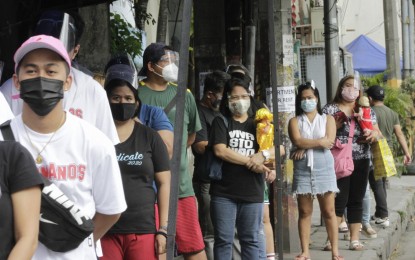
File photo
MANILA – A survey by OCTA Research shows that a big chunk of the Filipino population will continue to wear face masks even if the spread of coronavirus disease 2019 (Covid-19) will be controlled.
OCTA Research fellow Ranjit Rye presented the recent survey of the group following the issuance of Malacañang Palace on the voluntary wearing of face masks in outdoor settings.
“(This is) also probably the reason why very few reactions from the people against the new policy of the President, is because 30 percent of the adult population will continue to wear masks six months after Covid-19 is declared controlled,” Rye said during the Pandesal Forum Tuesday.
Twenty-eight percent of the respondents said they will continue wearing face masks a year after Covid-19 is declared controlled, 16 percent said they will continue it even after two years, and 18 percent said they will continue wearing face masks five years after the coronavirus is deemed controlled.
“These are huge numbers. There seems to be a consensus among adult Filipinos that masks are important and we don’t need to encourage them. They will wear masks because of their belief that it is for their own safety,” Rye added.
He said the survey result jives well with the new policy of President Ferdinand “Bongbong” Marcos Jr. on outdoor masking.
“We don’t need to mandate it. People will wear it and the big chunk of the population will continue to wear it even after Covid is declared gone,” he said.
Developmental delays on children
In the same virtual forum, OCTA Research fellow Fr. Nicanor Austriaco cited the recent findings of Dr. Leana Wen -- CNN medical analyst, physician, and professor at the George Washington University Milken Institute School of Public Health in the United States -- that masking has an effect on the development of children.
Austriaco said Wen discovered that her four-year-old son had developmental delays, specifically language development, because of masking more than two years being in a pandemic.
He said that even when students have returned physically to school, the interaction can be considered as “mask-to-mask” rather than “face-to-face” classes as children still have to wear face masks.
Austriaco said the country should move to the normal face-to-face classes, without the masks, the soonest time possible to prevent developmental delays among the young population.
“I urged that the entire country is vaccinated and boosted as soon as possible. If not possible, because they do not want to, then we should remove the masks and allow them to live as adults with consequences of their choices in order to protect their children,” he said. (PNA)
